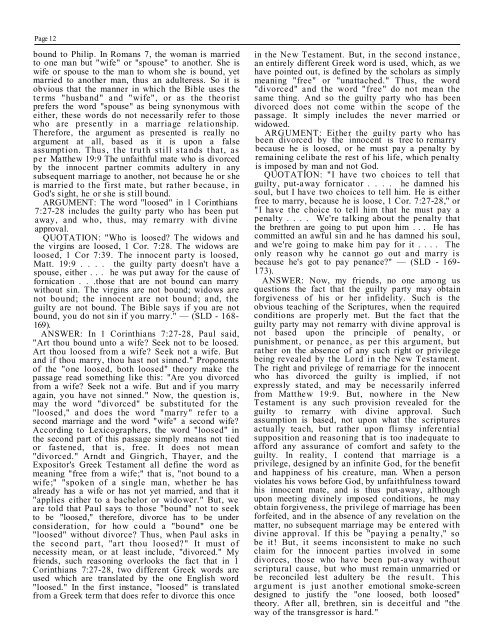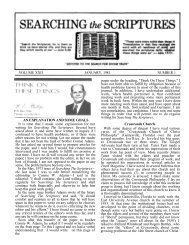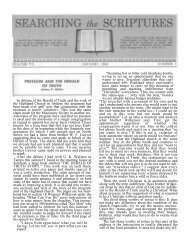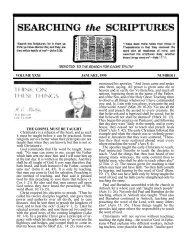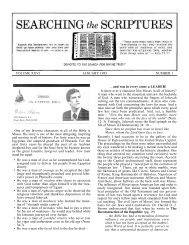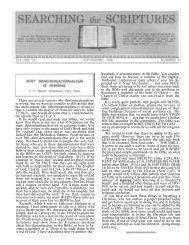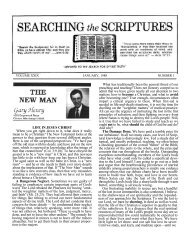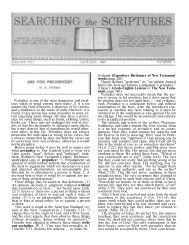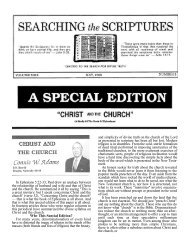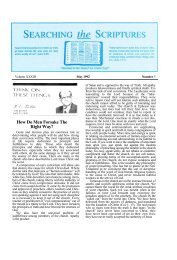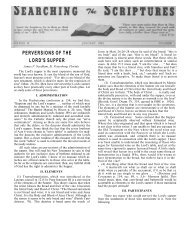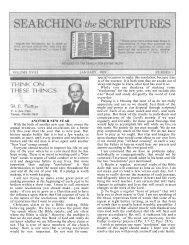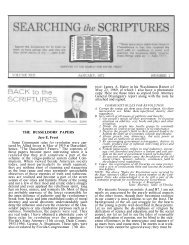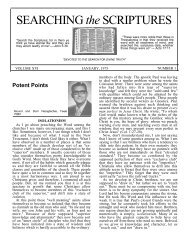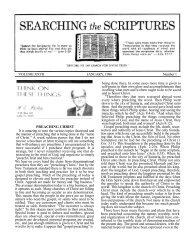Volume 21 – 1980 (PDF) - Searching The Scriptures
Volume 21 – 1980 (PDF) - Searching The Scriptures
Volume 21 – 1980 (PDF) - Searching The Scriptures
Create successful ePaper yourself
Turn your PDF publications into a flip-book with our unique Google optimized e-Paper software.
Page 12<br />
bound to Philip. In Romans 7, the woman is married<br />
to one man but "wife" or "spouse" to another. She is<br />
wife or spouse to the man to whom she is bound, yet<br />
married to another man, thus an adulteress. So it is<br />
obvious that the manner in which the Bible uses the<br />
terms "husband" and "wife", or as the theorist<br />
prefers the word "spouse" as being synonymous with<br />
either, these words do not necessarily refer to those<br />
who are presently in a marriage relationship.<br />
<strong>The</strong>refore, the argument as presented is really no<br />
argument at all, based as it is upon a false<br />
assumption. Thus, the truth still stands that, as<br />
per Matthew 19:9 <strong>The</strong> unfaithful mate who is divorced<br />
by the innocent partner commits adultery in any<br />
subsequent marriage to another, not because he or she<br />
is married to the first mate, but rather because, in<br />
God's sight, he or she is still bound.<br />
ARGUMENT: <strong>The</strong> word "loosed" in 1 Corinthians<br />
7:27-28 includes the guilty party who has been put<br />
away, and who, thus, may remarry with divine<br />
approval.<br />
QUOTATION: "Who is loosed? <strong>The</strong> widows and<br />
the virgins are loosed, 1 Cor. 7:28. <strong>The</strong> widows are<br />
loosed, 1 Cor 7:39. <strong>The</strong> innocent party is loosed,<br />
Matt. 19:9 . . . . the guilty party doesn't have a<br />
spouse, either . . . he was put away for the cause of<br />
fornication . . .those that are not bound can marry<br />
without sin. <strong>The</strong> virgins are not bound; widows are<br />
not bound; the innocent are not bound; and, the<br />
guilty are not bound. <strong>The</strong> Bible says if you are not<br />
bound, you do not sin if you marry." — (SLD - 168-<br />
169).<br />
ANSWER: In 1 Corinthians 7:27-28, Paul said,<br />
"Art thou bound unto a wife? Seek not to be loosed.<br />
Art thou loosed from a wife? Seek not a wife. But<br />
and if thou marry, thou hast not sinned." Proponents<br />
of the "one loosed, both loosed" theory make the<br />
passage read something like this: "Are you divorced<br />
from a wife? Seek not a wife. But and if you marry<br />
again, you have not sinned." Now, the question is,<br />
may the word "divorced" be substituted for the<br />
"loosed," and does the word "marry" refer to a<br />
second marriage and the word "wife" a second wife?<br />
According to Lexicographers, the word "loosed" in<br />
the second part of this passage simply means not tied<br />
or fastened, that is, free. It does not mean<br />
"divorced." Arndt and Gingrich, Thayer, and the<br />
Expositor's Greek Testament all define the word as<br />
meaning "free from a wife;" that is, "not bound to a<br />
wife;" "spoken of a single man, whether he has<br />
already has a wife or has not yet married, and that it<br />
"applies either to a bachelor or widower." But, we<br />
are told that Paul says to those "bound" not to seek<br />
to be "loosed," therefore, divorce has to be under<br />
consideration, for how could a "bound" one be<br />
"loosed" without divorce? Thus, when Paul asks in<br />
the second part, "art thou loosed?" It must of<br />
necessity mean, or at least include, "divorced." My<br />
friends, such reasoning overlooks the fact that in 1<br />
Corinthians 7:27-28, two different Greek words are<br />
used which are translated by the one English word<br />
"loosed." In the first instance, "loosed" is translated<br />
from a Greek term that does refer to divorce this once<br />
in the New Testament. But, in the second instance,<br />
an entirely different Greek word is used, which, as we<br />
have pointed out, is defined by the scholars as simply<br />
meaning "free" or "unattached." Thus, the word<br />
"divorced" and the word "free" do not mean the<br />
same thing. And so the guilty party who has been<br />
divorced does not come within the scope of the<br />
passage. It simply includes the never married or<br />
widowed.<br />
ARGUMENT: Either the guilty party who has<br />
been divorced by the innocent is tree to remarry<br />
because he is loosed, or he must pay a penalty by<br />
remaining celibate the rest of his life, which penalty<br />
is imposed by man and not God.<br />
QUOTATION: "I have two choices to tell that<br />
guilty, put-away fornicator . . . . he damned his<br />
soul, but I have two choices to tell him. He is either<br />
free to marry, because he is loose, 1 Cor. 7:27-28," or<br />
"I have the choice to tell him that he must pay a<br />
penalty .... We're talking about the penalty that<br />
the brethren are going to put upon him ... He has<br />
committed an awful sin and he has damned his soul,<br />
and we're going to make him pay for it . . . . <strong>The</strong><br />
only reason why he cannot go out and marry is<br />
because he's got to pay penance?" — (SLD - 169-<br />
173).<br />
ANSWER: Now, my friends, no one among us<br />
questions the fact that the guilty party may obtain<br />
forgiveness of his or her infidelity. Such is the<br />
obvious teaching of the <strong>Scriptures</strong>, when the required<br />
conditions are properly met. But the fact that the<br />
guilty party may not remarry with divine approval is<br />
not based upon the principle of penalty, or<br />
punishment, or penance, as per this argument, but<br />
rather on the absence of any such right or privilege<br />
being revealed by the Lord in the New Testament.<br />
<strong>The</strong> right and privilege of remarriage for the innocent<br />
who has divorced the guilty is implied, if not<br />
expressly stated, and may be necessarily inferred<br />
from Matthew 19:9. But, nowhere in the New<br />
Testament is any such provision revealed for the<br />
guilty to remarry with divine approval. Such<br />
assumption is based, not upon what the scriptures<br />
actually teach, but rather upon flimsy inferential<br />
supposition and reasoning that is too inadequate to<br />
afford any assurance of comfort and safety to the<br />
guilty. In reality, I contend that marriage is a<br />
privilege, designed by an infinite God, for the benefit<br />
and happiness of his creature, man. When a person<br />
violates his vows before God, by unfaithfulness toward<br />
his innocent mate, and is thus put-away, although<br />
upon meeting divinely imposed conditions, he may<br />
obtain forgiveness, the privilege of marriage has been<br />
forfeited, and in the absence of any revelation on the<br />
matter, no subsequent marriage may be entered with<br />
divine approval. If this be "paying a penalty," so<br />
be it! But, it seems inconsistent to make no such<br />
claim for the innocent parties involved in some<br />
divorces, those who have been put-away without<br />
scriptural cause, but who must remain unmarried or<br />
be reconciled lest adultery be the result. This<br />
argument is just another emotional smoke-screen<br />
designed to justify the "one loosed, both loosed"<br />
theory. After all, brethren, sin is deceitful and "the<br />
way of the transgressor is hard."


